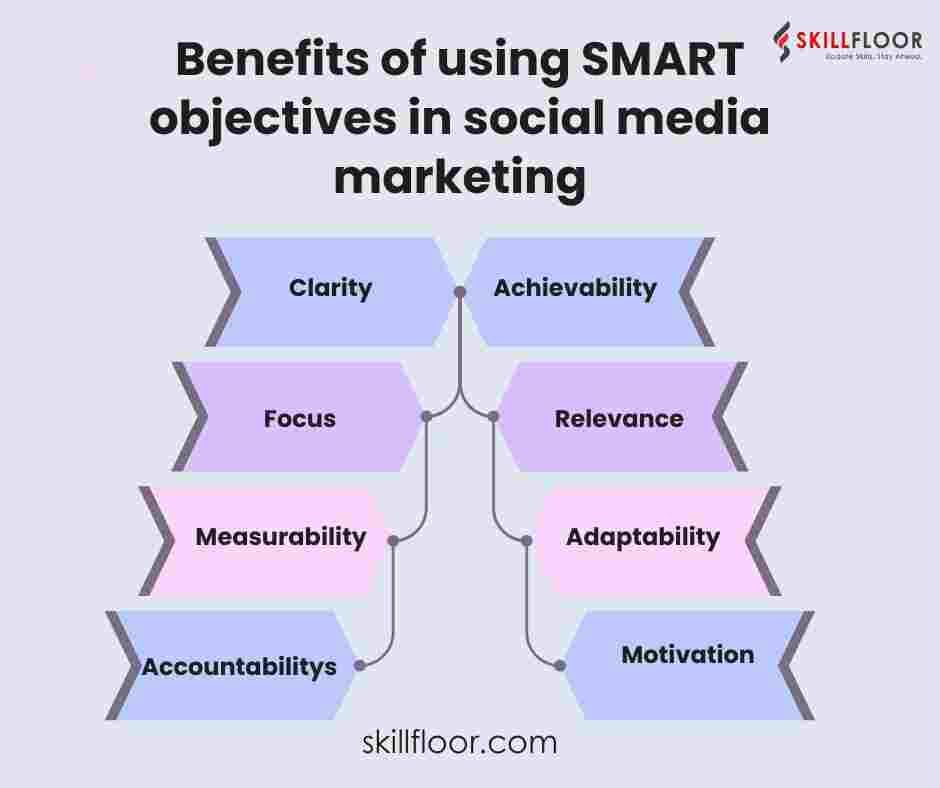Benefits of smart Social Media Marketing Objectives
Learn how setting smart social media marketing Objectives can boost your brand's online presence, engagement, and return on investment.

Welcome to the world of social media marketing, where attention is more in demand than ever before and the online environment is always changing. Success in this ever-changing climate depends on having a well-defined and targeted strategy. That's why it's important to develop SMART goals. We'll explore the topic of SMART Social Media Marketing Objectives in this extensive tutorial. We'll analyze the word and examine what it means to establish goals that are Time-bound, Specific, Measurable, Achievable, and Relevant. Understanding and putting into practice SMART Social Media Marketing Objectives can make all the difference in achieving your social media marketing goals and improving your impact, regardless of experience level in the marketing field.
Consider yourself the digital marketing manager of a tiny online store that sells custom jewelry. You've been actively promoting your goods on Facebook, Pinterest, Instagram, and other social media sites for the past few months. Even if you've had some success with interaction and website traffic, you understand that to promote long-term growth, you need to set more precise Social Media Marketing Objectives. Consider yourself the digital marketing manager of a tiny online store that sells custom jewelry. You've been actively promoting your goods on Facebook, Pinterest, Instagram, and other social media sites for the past few months. Even if you've had some success with interaction and website traffic, you understand that to promote long-term growth, you need to set more precise Social Media Marketing Objectives.
Common challenges faced by marketers when setting social media objectives
-
Lack of Clarity: Defining social media objectives without clarity is one of the most common issues. The failure of marketers to clearly state quantifiable, targeted goals that complement overarching company objectives may lead to goals that are unclear or imprecise.
-
Setting Realistic Goals: Setting too ambitious or unachievable social media goals is a problem that marketers frequently encounter. In addition to demotivating team members, this can cause discontent and disappointment when goals are not met.
-
Failing to Align Social Media Objectives with Audience Needs: Not connecting social media goals with the wants and needs of the intended audience is another problem. In lacking a full understanding of the demographics, behaviors, and preferences of their audience, marketers might set goals that fail to connect with them, which could result in ineffective social campaigns.
-
Absence of Measurable KPIs: A lot of marketers find it difficult to establish quantifiable KPIs for their social media goals. It becomes challenging to monitor advancement, assess performance, and make data-driven decisions for campaign optimization without well-defined metrics.
-
Restricted Resources: When establishing social media goals, marketers face significant obstacles due to limited budget, people, and time. To maximize ROI, marketers might have to decide which goals to prioritize based on the resources at their disposal and make calculated decisions.
-
Adapting Trends and Algorithms: Social media companies regularly roll out new features and make changes to their algorithms, which can affect how well marketing campaigns work. To keep up with these developments, marketers need to remain flexible and modify their goals.
-
Reaching a Balance Between Short-Term and Long-Term Goals: It can be difficult to strike a balance between short-term goals like raising website traffic or engagement and long-term goals like building brand awareness or fostering consumer loyalty. Marketers need to find a way to reconcile long-term growth with quick results.
What are Benefits of using SMART objectives in social media marketing?

Clarity: By setting specific, clear goals, SMART objectives guarantee everyone is aware of what has to be achieved. This clarity improves communication channels, lowers confusion, and promotes team alignment—all of which contribute to more productive and successful teamwork.
Focus: You can reduce distractions and lost energy by focusing your efforts and resources on tasks that directly advance your business goals by creating SMART objectives. With this targeted approach, you can carefully manage your time and money to get the most out of your social media activities and produce measurable outcomes.
Measurability: Because SMART goals are meant to be measurable, you can use them to measure your progress and assess the effectiveness of your social media initiatives. This measuring offers valuable insight into how well your social media marketing campaigns are performing, allowing for data-driven decision-making and tweaks to improve your tactics for better results.
Accountability: Because progress can be readily tracked and evaluated about preset standards, SMART objectives help hold people and groups responsible for their performance. By encouraging people to take ownership of their work and aim for excellence in reaching their goals, accountability promotes a culture of responsibility and ownership.
Achievability: SMART goals are realizable within a specified time range, which helps to manage expectations and keep people from getting irritated or burned out. Team members are inspired and inspired by this achievability factor because they can see real progress toward their objectives and feel prepared to overcome obstacles in their path.
Relevance: SMART goals are in line with your overarching business goals, guaranteeing that your social media initiatives make a significant contribution to the success of your company. This significance guarantees that your marketing campaigns have a long-term positive impact and are strategically in line with the larger objectives and vision of your business, fostering long-term success and sustainable growth.
Adaptability: Your social media strategy can be flexible and agile by changing or refining SMART objectives as necessary to account for shifts in audience preferences, market conditions, or company priorities. Because of your ability to quickly adjust to changing conditions and acquire new chances, you can make sure that your marketing initiatives stay relevant and successful in a changing environment.
Motivation: By giving people and teams a feeling of direction and purpose, SMART targets inspire them to work together towards a common goal and recognize their progress along the way. This drive increases engagement and develops a culture of success inside your company by creating a positive work environment and a sense of friendship among team members.
In the highly competitive world of social media marketing today, SMART goal-setting is essential to success. Your marketing activities will have clarity, focus, and accountability thanks to SMART objectives, which stand for Specific, Measurable, Achievable, Relevant, and Time-bound. They make sure that resources are used effectively and that everyone is working towards the same objectives. With SMART goals, you can monitor your progress, adjust to circumstances, and produce significant outcomes that enhance the success of your company as a whole. Therefore, the secret to reaching your marketing objectives and increasing your impact—whether you're an experienced marketer or just getting started—is to include SMART objectives in your social media strategy.




























































